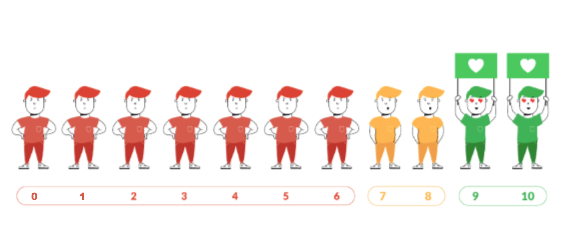What is the Net Promoter Score (NPS)?
The Net Promoter Score (NPS) measures the extent to which your customers would recommend your business to their environment. Nowadays the NPS is the standard for measuring and improving customer loyalty. Starred have this integrated into the tool so you can calculate your company's score. If you're not familiar with the NPS, no problem. Below is a brief explanation of the NPS method.
Fred Reichheld developed the NPS methodology, which is based on asking one single question to customers as a predictor for further purchases and recommendations. The question is: "How likely is it, on a scale of 0 to 10, that you would recommend us to a friend or colleague?"

The Net Promoter Score is based on the theory that every business can divide their customers into three categories:
- Promoters (9 & 10)
- Passives (7 & 8)
- Detractors (0/6)
As a business, you would prefer promoters because these customers are very excited about your product or service. Due to their excitement, they will recommend your product or service to friends, family and others in their environment. Passives are satisfied but they will not recommend your company to their surroundings. Detractors are not very satisfied and tend to be more negative while giving responses compared to the other two groups, this group will not make recommendations.
How is the NPS calculated?
The Net Promoter Score is calculated as the difference between the percentage of Promoters and Detractors (see illustration above).
For example, if 50% of applicants are detractors, 10% are passives, and 40% are promoters, your NPS score would be 40-50 = Final NPS of -10
The NPS itself is not expressed as a percentage, but as an absolute number, which is situated somewhere between -100 and +100. If you have included the NPS question in your feedback survey, you can find you NPS rating by going to your dashboard.
Updated 6 months ago
